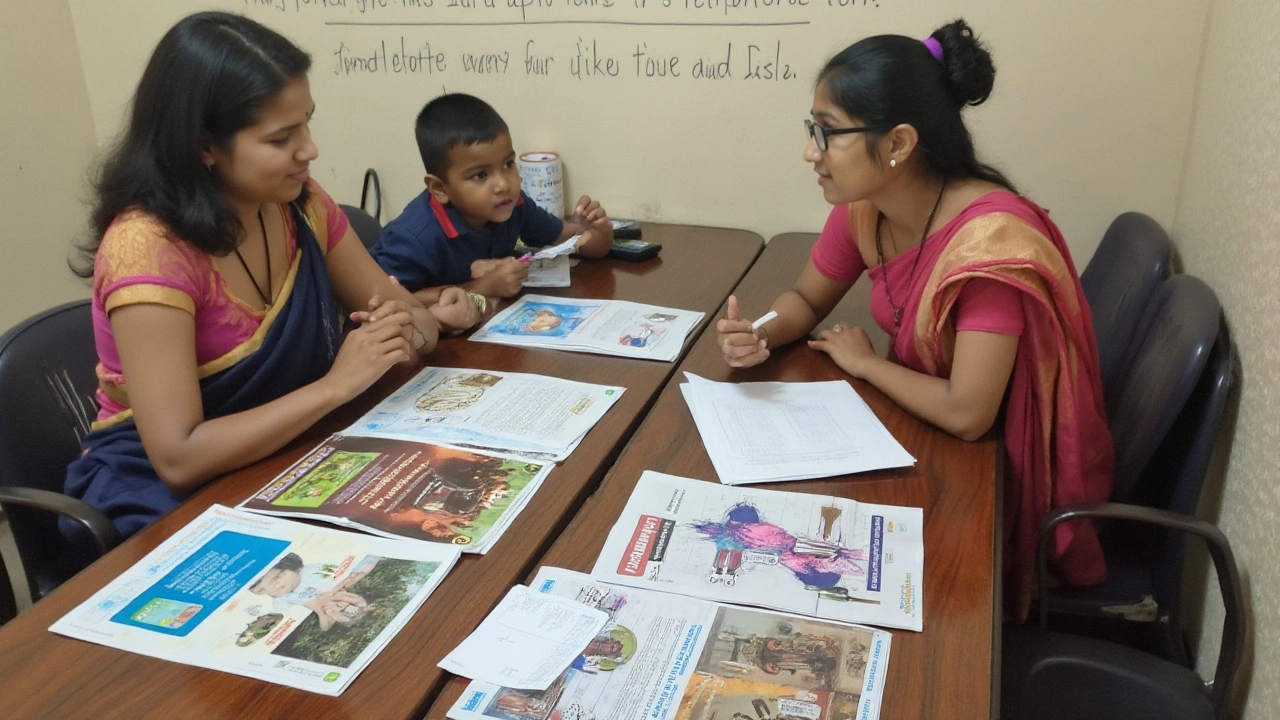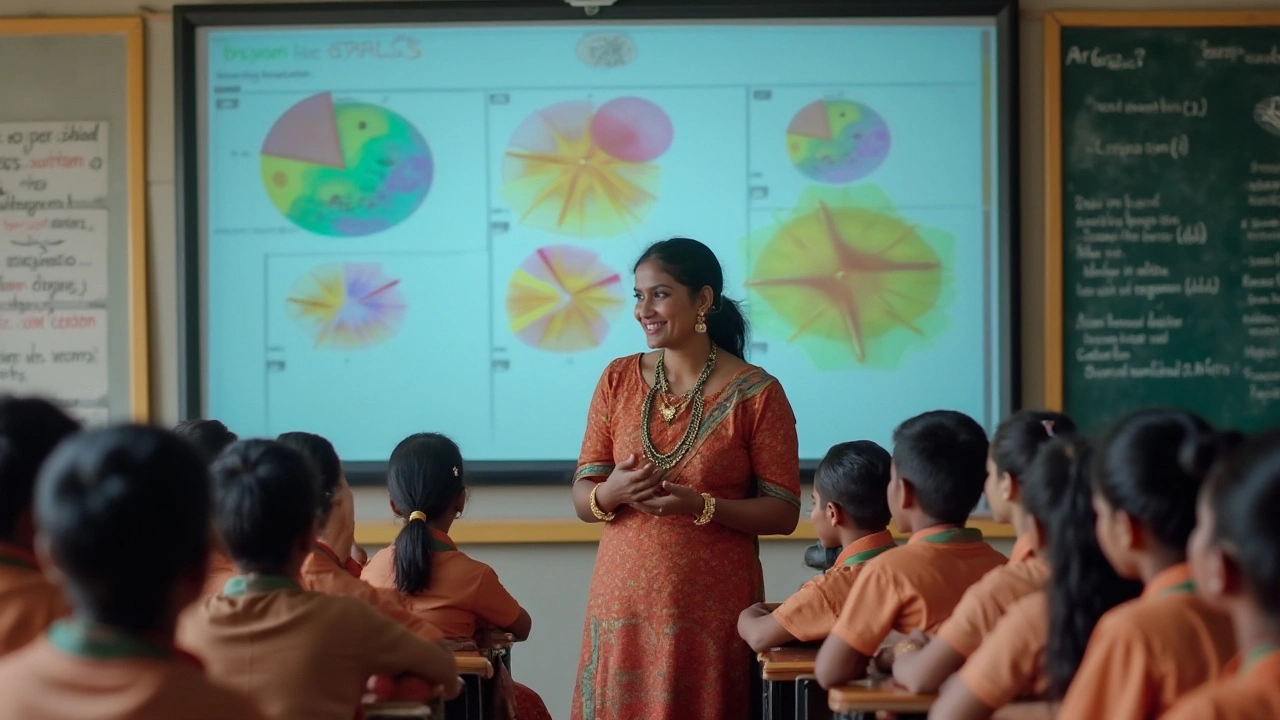Choosing the right educational board for your child is a journey that demands thoughtful consideration and understanding. With various options available, each offering distinct features and benefits, it's crucial to align the board choice with your child's interests and your family's values.
As parents, navigating this decision involves more than just academic outcomes; it involves understanding the teaching styles, assessment criteria, and opportunities each board presents. This article sheds light on one of the most prominent educational boards—CBSE—and explores its potential to shape a promising future for your child.
By delving into the unique aspects of the CBSE syllabus and offering practical tips for making this choice, we aim to empower you with knowledge and confidence in your decision-making process.
- Understanding the Role of Educational Boards
- Advantages of the CBSE Syllabus
- Comparing CBSE with Other Boards
- Tips for Parents in Choosing the Right Board
Understanding the Role of Educational Boards
Educational boards serve as the cornerstone of a nation's academic infrastructure, shaping the way students learn and interact with the world around them. They are responsible for setting the curriculum, establishing assessment protocols, and ensuring that educational standards meet the necessary requirements to adequately prepare students for the future. Each board comes with its own set of distinguished goals and priorities, providing a structure where knowledge is not only imparted but also evaluated. This evaluation is pivotal as it gauges a student's readiness to face real-world challenges. While some boards emphasize rote learning, others lean towards fostering critical thinking and creativity, allowing students to explore subjects in depth and at their own pace.
The choices parents make regarding these boards influence their children's career paths significantly. The CBSE, loved by many, is known for its uniformity and adaptability, offering a vast advantage to students who frequently relocate within India or abroad. It ensures that wherever the student moves, the learning curve remains consistent. Other boards, like the ICSE and international boards such as the IB, might focus more on diverse learning methodologies and languages, catering to different developmental needs of children. Such diversity helps in nurturing a well-rounded education. An important fact highlighted by educational expert Dr. Vivek Agnihotri states,
"The board you choose should fit well with your child's learning style, reinforcing their strengths."This choice, undoubtedly, has long-lasting effects, impacting college admissions, career choices, and even personal development.
Each of these educational systems is designed to prepare students not just for exams, but for life. By instilling a meaningful educational experience, they create pathways for students to excel in both academic and co-curricular undertakings. An effective board doesn't just focus on scores. It appreciates and nurtures a balance between knowledge, skill, and creativity. Therefore, when parents are faced with choosing an educational board for their child, it's essential to understand what each board offers in terms of educational goals and learning environments. By doing so, they can tailor a learning experience that best fits the unique needs and aspirations of their child.
When comparing boards, it's useful to look at their approach towards learning and assessment styles. The CBSE syllabus, for example, follows a content-based approach where subjects are structured in a hierarchical manner. This system favors students who thrive with structured learning and offer them a deep engagement with core subjects. Whereas an experiential learning board might encourage students to participate in hands-on projects and problem-solving exercises, fostering more abstract and critical thought processes. Such differences are instrumental in aiding students as they navigate through the myriad of opportunities post-schooling.
The Influence of Educational Boards on Careers
The influence of educational boards extends far beyond the classroom walls. It reaches into the future landscape of a child's career trajectory. For instance, students educated under a board which heavily emphasizes technical knowledge and factual learning might find themselves better prepared for competitive exams, leading to careers in engineering or medicine. On the other hand, a board that endorses an inquiry-based, holistic educational approach might steer students towards creative industries or innovative fields that value diverse perspectives. A recent survey conducted by the National Educational Research Council provides data on university placements according to board affiliations:
| Board | University Placements (%) |
|---|---|
| CBSE | 63% |
| ICSE | 55% |
| State Boards | 47% |
| IB | 72% |

Advantages of the CBSE Syllabus
When it comes to educational choices, the Central Board of Secondary Education, known as CBSE, has consistently stood out as a leading option. One of the most celebrated advantages of the CBSE syllabus is its structured and balanced curriculum, which carefully aligns concepts with real-life applications. This makes learning more relatable and enjoyable for students. As an Indian board recognized globally, CBSE offers a versatile and comprehensive approach to education that encourages a holistic development model. With a syllabus designed to build a strong foundation in the primary years, students can transition smoothly into specialized streams without losing clarity on core subjects. This focus on clarity and foundational strength prepares students not just for internal school exams, but also for competitive exams on a national and international level.
Another hallmark of the CBSE syllabus is its adaptability to changes and improvements in educational trends. Over the years, the board has integrated various life skill programs and practical assessments to nurture critical thinking and creativity among students. The introduction of Continuous and Comprehensive Evaluation (CCE) is evidence of its commitment to dynamic learning environments where students are evaluated through varied academic and extracurricular activities, rather than relying solely on traditional exams. This has fostered an atmosphere where children can flourish not merely as academics, but as balanced individuals with well-rounded skills. Parents often appreciate the CBSE’s emphasis on interactive and modern teaching methodologies that keep pace with the advancing world.
The CBSE board also takes pride in offering an environment that is flexible for expatriate children. Schools across different countries offer a CBSE curriculum, allowing parents to ensure that their child's education is not disrupted even if the family moves internationally. Such global acceptance of the CBSE syllabus opens doors to prestigious universities worldwide, giving students a competitive edge. In the words of Dr. Shashi Tharoor, a prominent advocate of educational reform, "CBSE’s emphasis on fostering an environment of holistic learning bodes well for the future prospects of students who emerge as global citizens." This statement reflects the board’s mission to equip students with the skills needed to thrive in a constantly evolving global landscape.
Statistics have shown that students trained under the CBSE board syllabus exhibit exemplary results in entrance exams like JEE and NEET, which are crucial for entry into India’s premier engineering and medical institutes. A closer look at performance metrics over the past few years reveals that the syllabus's well-rounded nature not only covers the academic aspects but also equips students with stress management and problem-solving skills. A significant number of students find that the standard textbooks prescribed by the CBSE board simplify complex topics, providing in-depth explanations that improve comprehension, an advantage clearly highlighted by consistent trends in student feedback surveys.
The CBSE syllabus, through its thoughtful inclusion of technology in classrooms via Smart Boards and e-learning tools, ensures that students are not just passive learners but active participants in their educational journey. The integration of digital tools not only aids teachers in delivering content effectively but also ignites students’ curiosity and engagement levels. Workshops and seminars on digital literacy are regularly part of the curriculum, making students tech-savvy and ready for the future workforce. As we delve into an era where technology is intertwined with everyday life, the CBSE board equips learners with the ability to harness such resources confidently. Understanding these advantages can help parents make informed decisions based on tangible, educational benefits afforded by the CBSE syllabus.

Comparing CBSE with Other Boards
When it comes to choosing an educational board for your child, simply understanding the detailed nuances and key differences can help parents make a more informed decision. The Central Board of Secondary Education, or the CBSE syllabus, is renowned for its structured yet student-friendly educational approach. It follows a national curriculum that’s both scientific and progressive, preparing students for national-level competitive exams and providing a uniform platform across India. Now, let's compare this with other prevalent boards like the State Boards, ICSE, and international options such as IGCSE and IB.
The State Boards primarily cater to regional needs, adapting their syllabus to state-specific topics, which means they may excel in regional languages and state-related history. However, the inconsistency in quality across states poses concerns for parents considering frequent relocations. In contrast, CBSE's uniformity in curriculum is a blessing for families that move frequently, ensuring minimal disruption in the child's educational journey, no matter where they are located in the country.
Comparison with ICSE often highlights CBSE’s approach to science and mathematics with more focus, while ICSE tends to prioritize a balanced structure across humanities, arts, and sciences. While ICSE emphasizes the English language, CBSE shines with competitive exams such as JEE and NEET in its syllabus, giving an edge to students who wish to pursue professional courses in engineering or medicine from reputed institutes in India.
International boards like IGCSE and IB bring a different flavor altogether. IB encourages analytical skills and research-based learning with an emphasis on critical thinking. It's designed to develop globally-minded students, aiming to resemble college-level coursework. CBSE, while not as globally recognized as IB, is gaining traction due to its adaptive curriculum and internationally affiliated schools. An interesting note here is that according to a study by the National Institute of Educational Planning and Administration, 23% of Indian students from the U.K. opt for CBSE-based schools to ensure higher compatibility with Indian professional exams.
Quote from a seasoned educator, Mrs. Sharma from Delhi Public School, "While various boards have their strengths, CBSE offers a holistic approach that prepares students not just academically but also for life skills. Its flexibility and focus on value education are commendable." Such perspectives highlight the well-founded reputation of CBSE amidst other alternatives.
| Board | Focus Area | Global Recognition |
|---|---|---|
| CBSE | Science, Math | Moderate, Increasing |
| ICSE | English, Arts | Moderate |
| IB | Critical Thinking | High |
| State Boards | Regional Topics | Low |
Ultimately, the choice between CBSE and other boards boils down to the priorities of the student and family. The educational landscape is diverse, and each board brings out a set of unique advantages that cater differently based on location, goals, and career aspirations. The CBSE board remains a solid option for many due to its strategic blend of traditional and modern teaching methodologies, its growing global network, and its alignment with competitive exams.

Tips for Parents in Choosing the Right Board
Selecting the most suitable educational board for your child is a decision that carries weighty implications for their academic and personal growth. When weighing the options, it's essential to take into consideration the unique strengths and interests of your child. Think about how each board can cater to their learning style and long-term aspirations. Importantly, engage in open dialogues with educators and other parents to gain deeper insights. For instance, the CBSE syllabus is known for its well-structured and student-friendly approach that's designed to build a robust knowledge foundation, which could be immensely beneficial for students aiming to excel in competitive exams.
It's also crucial to evaluate the teaching methodologies and values that each board upholds. For parents of younger children, the focus might be on fostering a balance between academics and extracurricular pursuits. Meanwhile, those choosing for adolescents may want to prioritize boards providing opportunities for international recognition and mobility. Discussing these opportunities with teachers who are experienced with different boards can provide valuable perspectives. As noted by educational consultant Priya Iyer,
"A board that emphasizes practical learning prepares students not just for exams, but for life beyond the classroom as well."
Looking into how schools under various boards tackle real-world skills like critical thinking and problem-solving is equally pivotal. For households where mobility is a factor, the CBSE syllabus can be especially appealing due to its widespread recognition both nationally and internationally. This becomes instrumental for families considering potential relocations in the near future. Additionally, examining past student experiences shared through parent-teacher associations can offer authentic insights into the execution of the board syllabus at a grassroots level.
Start your research by visiting multiple school campuses to witness firsthand how the board’s educational philosophy is implemented. Observing the school culture, expertise of the faculty, and available resources can heavily influence your decision. Understanding if a board supports continuous assessment or final examinations is also central. Schools following the CBSE syllabus usually stress continuous learning and periodic evaluations, which can ease the examination pressure on your child.
Ultimately, remember to keep your child's best interests at the core of this decision. Pay attention to their feedback and instincts when visiting schools and discussing their potential future with them. Reflect on how each board aligns with their personal learning attitudes and future goals. By considering all these aspects thoughtfully, you can make an informed choice that paves a positive path for your child's educational journey.







